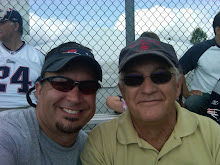When I was in my early twenties, I used to get up in the morning in the summer and decide whether I wanted to go a ball game or not. Rarely did I have tickets, but I loved the art of trying to buy tickets on the street, (illegal scalping, is the art of selling a ticket to an event above face value). In a daring exhibit of manhood, I tried to get the “scalper” to lower his ticket price, while keeping an eye out for undercover police officers who would take your tickets away. I do not know what was more exciting the game or the art of securing a cheap ticket out on the street.
Scalping is still illegal in most states outside a venue, but in today’s day and age we now have legalized scalpers. They are called ticket agencies. Ticket agencies buy season tickets and charge exorbitant amount of money above face value. Most of these agencies advertise as they are considered a legitimate business. What I do not understand is why they are allowed to operate.
Going to a ballgame is a wonderful experience for a family, but with today’s tough economic times it is hard enough to go to a game without taking out a loan, if you could get one from a bank nowadays. The average ticket price for a major league baseball game is over seventy five dollars and a professional football game averages over one hundred dollars per ticket. The ticket agencies charge well over four times the face value of these tickets to these events.
A Red Sox fan fed up with the stratospheric price of second-hand baseball tickets had his lawsuit tossed by Massachusetts's highest court last week. Colman Herman, of Dorchester, Ma, filed suit against the Admit One Ticket Agency in 2006, claiming that the agency's $415-dollar markup of a 2005 Sox ticket violated state anti-scalping laws.
The state law cited in Herman's complaint limits ticket markups to no more than $2 over the original face value. Herman, the suit's plaintiff, however, was unconvinced. He told the legislature that erasing limits on resale prices would limit Red Sox attendance to the wealthy, leaving the average ball fan out in the cold. Herman was exactly right.
Several musicians have tried to stop the resale of tickets with little or no success. They see what many of us see, a deep segregation of the have and the have not’s in our culture when it comes to going to events. How can an average family pay seven hundred dollars to take their family to a U2 concert?
Why are ticket brokers allowed to sell well above face value against many state laws. The government does not want third parties to profit off of other businesses. While scalping tickets does effectively help cover the portion of the "demand" market, it does so at the expense of making a dollar on the company. Overall, this aids in causing the demand to go down and the prices for the business to drop over the long run. Does that make sense to anyone? It certainly does not make any sense to me. Never did I pay four times the amount above face value when I went purchased tickets on the street as a twenty year old.
The secondary market for high-demand, limited-seating-event tickets always exists and creates the opportunity for ticket scalping. The secondary market occurs because seats are sold in advance of events. When a line is expected, ticket scalpers are present because time may not be a readily available commodity for some purchasers. Those buyers would prefer to pay with more money. Typically, those consumers have a high opportunity cost of time and view scalping as a legitimate market exercise. Scalpers are simply time brokers who perform a useful service.
However, it is crucial to recognize that even when a line is not expected when tickets first go on sale, either because an event is not a sellout or because the printed face value clears the market perfectly and a sellout is achieved, scalping is inevitable. Some consumers with tickets will decide not to attend. They want to get rid of their tickets. Others are in the market for (good) seats up to the time of the event. Reallocation is the natural outcome. Reallocation at a huge price mark up to the consumer is just flat out wrong.
Nevertheless, unregulated freelance scalping at the event is still illegal in most population centers. While enforcement remains sporadic and results in few convictions, there is something quite troublesome from a free-market perspective about restricting resale activities just before an event. The essence of the market for those types of limited-seating, one-time events is their here-and-now nature. The time when the greatest fluctuation in price is often most necessary is immediately before an event so that those who most want to attend and are most willing to pay can indeed get access. Ticket agencies who “buy up” all the good seats only to create a higher market needs to be regulated.
Follow me on twitter at https://twitter.com/drcchasse
E-mail me at drcchasse@verizon.net to get on our mailing list.
Please forward to your friends and colleagues to enjoy. The more readers I have, the more money that is raised for the Dana Farber Cancer Institute.
voice 206-350-6437
Thursday, October 1, 2009
Subscribe to:
Post Comments (Atom)



No comments:
Post a Comment